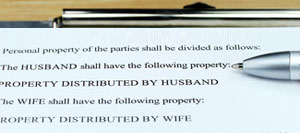Divorce and Bankruptcy

The filing of a bankruptcy case by one spouse, called the "debtor spouse", does not prevent the other spouse from filing for divorce and seeking support payments. The non-debtor spouse does not have to request permission from the Bankruptcy Court to take such action. However, some Family Court judges may require an order from the Bankruptcy Court before they approve or modify support payments.
If a spouse owes child or spousal support and files bankruptcy, he or she must continue to make the support payments. Support payments cannot be discharged in bankruptcy and are given priority over payments made to other unsecured debts, including taxes.
If one spouse agrees to pay credit card or other marital debts under the spouses' separation or settlement agreement, the Bankruptcy Court may discharge the debtor spouse's obligation to do so, or it may find that the debtor spouse's obligation is a form of support and cannot be eliminated. Property settlements may also be eliminated in bankruptcy, but only in Chapter 13 cases.
Both the Family Court and Bankruptcy Court have overlapping authority when it comes to the division of marital assets and who will be responsible for the couples' debts. The timing of filing for bankruptcy and divorce can affect the outcome in both cases. Based on your needs, priorities and financial condition, you may decide it's best to file a bankruptcy case before or after filing for divorce. This is an important issue that must be discussed with both a divorce attorney and bankruptcy lawyer to get it right.
Learn More about Debt Relief and Tax Relief - Divorce and Bankruptcy

